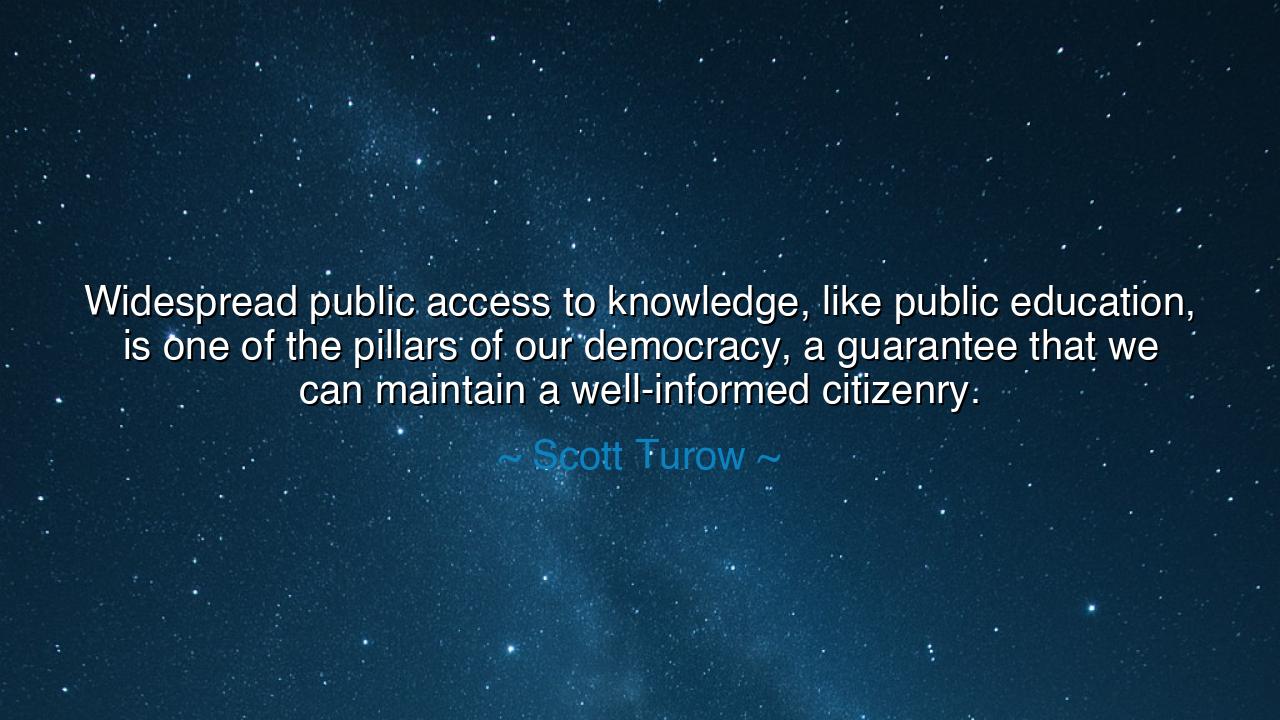
Widespread public access to knowledge, like public education, is
Widespread public access to knowledge, like public education, is one of the pillars of our democracy, a guarantee that we can maintain a well-informed citizenry.






Scott Turow, a man of law and letters, spoke with a voice both steady and prophetic when he declared: “Widespread public access to knowledge, like public education, is one of the pillars of our democracy, a guarantee that we can maintain a well-informed citizenry.” In this single sentence, he lifted the veil upon a truth that many forget: that freedom is not preserved by armies alone, nor by parchment constitutions, but by minds illuminated with understanding. Without access to knowledge, the people stumble in darkness, vulnerable to deception, and the pillars of liberty tremble.
The meaning of his words is urgent and eternal. Democracy lives only when citizens are equipped to think, to question, and to judge. To give the people education without access to continuing knowledge is to plant a seed but refuse it water. Libraries, schools, and the open sharing of information are the lifeblood of freedom, ensuring that no ruler, no elite, no demagogue can monopolize truth. For a people that knows, that reads, that learns, cannot be easily enslaved. But a people deprived of knowledge will bow to chains even while believing themselves free.
The origin of this wisdom lies deep in the American tradition itself. Turow, as a writer and advocate, drew from the long struggle for the democratization of learning. From the time of the nation’s founding, visionaries understood that a republic would wither without an informed populace. Thomas Jefferson himself declared that if he were to choose between a government without newspapers and newspapers without government, he would prefer the latter—for he knew that knowledge, freely shared, was more vital than any office or institution. Turow echoes this lineage, warning that democracy without education is an empty shell.
History has proved this lesson. In the 19th century, Andrew Carnegie, a man of immense wealth, gave his fortune to build thousands of public libraries. Why? Because he had risen from poverty through books freely borrowed, and he believed that the strength of a nation depended not on gold but on educated, informed citizens. Those libraries became beacons for millions, from factory workers to immigrants, who entered poor and weary but left enriched in mind and spirit. Carnegie knew, as Turow would later affirm, that public access to knowledge was not charity but the foundation of a free and prosperous people.
Yet history also warns of the opposite. Totalitarian regimes—whether in Nazi Germany, Stalin’s Russia, or other dark chapters—always begin by burning books, silencing teachers, and restricting access to knowledge. They know that an ignorant people is easier to control than an informed one. Where truth is hidden and lies are taught, democracy dies, and tyranny flourishes. The destruction of libraries, the censorship of thought, and the narrowing of education are not accidents—they are deliberate assaults on the very pillars that hold up freedom.
The lesson for us is clear and uncompromising. If we would keep democracy alive, we must defend public education and ensure widespread access to knowledge. This means protecting libraries, resisting censorship, supporting schools, and ensuring that truth is available to rich and poor alike. For when access to knowledge becomes a privilege of the few, democracy decays into oligarchy, and the promise of freedom becomes hollow.
So what must you do? Cherish your libraries as you would your temples. Defend the free press as you would your homes. Support the schools in your community, for they are not mere buildings but the forges of citizens. And above all, seek knowledge yourself—read widely, question boldly, and share what you learn. By doing so, you strengthen not only your own spirit but also the pillar upon which the liberty of your nation rests.
Thus remember Turow’s words: “Widespread public access to knowledge, like public education, is one of the pillars of our democracy.” Let them be a law written upon your heart. For freedom does not survive by chance, nor by inheritance alone—it survives by the vigilance of a people who know, who learn, and who refuse to surrender truth. Where knowledge flows, democracy stands tall; where it is stifled, freedom falls into ruin.






AAdministratorAdministrator
Welcome, honored guests. Please leave a comment, we will respond soon